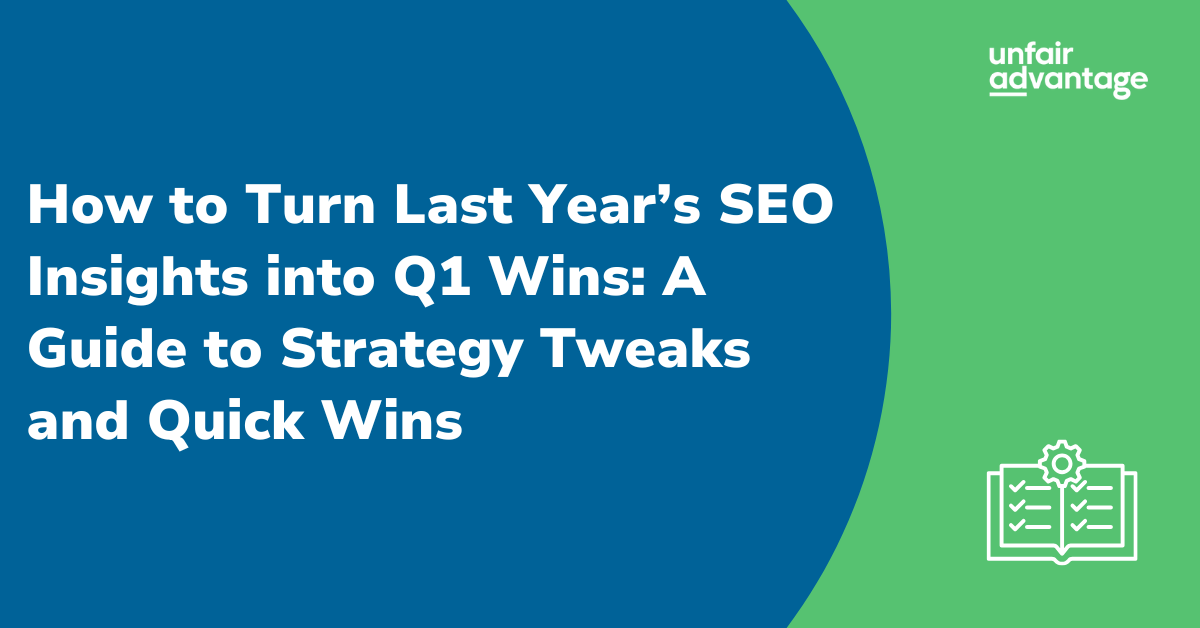
How to Turn Last Year’s SEO Insights into Q1 Wins: A Guide to Strategy Tweaks and Quick Wins
The start of a new year is the perfect opportunity to refine your SEO strategy using insights from the last 12 months. Whether you’re a business owner or a marketing director, the goal is clear: make impactful adjustments that transform last year’s lessons into meaningful results this quarter.
Here’s how to analyze, adapt, and apply actionable SEO insights to boost your Q1 outcomes.
1. Audit Last Year’s SEO Performance
Why It’s Important: Understanding how your site performed in search ensures you’re doubling down on strategies that work and avoiding the pitfalls of low-performing tactics.
Actionable Steps:
- Analyze Traffic Sources: Use tools like Google Analytics 4 to identify which keywords, pages, and channels drove the most organic traffic. Build on these successes.
- Review Rankings: Check your keyword rankings. Which terms improved, stagnated, or declined? Focus on terms with potential for higher visibility.
- Evaluate Conversion Paths: Traffic is only part of the equation. Look at which pages or keywords delivered conversions, not just clicks.
- Spot Technical Issues: Run a crawl of your site using tools like Screaming Frog or Ahrefs to identify errors like broken links, duplicate content, or slow page speeds.


2. Set Clear, Data-Driven SEO Goals
Why It’s Important: Defining measurable objectives ensures your strategy stays focused and aligned with overall business priorities.
Actionable Steps:
- Set Incremental Benchmarks: For example, aim to increase organic traffic by 10% each quarter or improve specific keyword rankings by two positions.
- Track the Right KPIs: Metrics like organic traffic, domain authority, bounce rate, and keyword rankings should directly align with your goals.
- Use Analytics Tools: Regularly monitor your progress with tools like Google Analytics and Google Search Console to stay on track.
3. Adjust Your Keyword and Content Focus
Why It’s Important: Since search behavior is constantly evolving, your keyword strategy should also. Aligning your strategy with these changes ensures your content continues to resonate with the most relevant user.
Actionable Steps:
- Expand on High-Performing Keywords: Build out content clusters around keywords that delivered results. For example, if “best eco-friendly packaging” performed well, create related guides or FAQs.
- Address Keyword Gaps: Use tools like SEMrush or Ahrefs to uncover keywords your competitors rank for but you don’t.
- Refresh Buyer Personas: Update personas with insights from last year’s data to refine how you approach content for each audience segment.
4. Update and Refresh Content
Why It’s Important: Keeping your content current not only boosts engagement but also improves your chances of ranking higher on Google as fresh, relevant content gets priority.
Actionable Steps:
- Repurpose Evergreen Content: Identify top-performing posts and update them with recent statistics, new insights, or fresh visuals to keep them relevant.
- Optimize Existing Content: Revisit older blogs to improve keyword placement, enhance meta descriptions, or include internal links to newer articles.
- Address Featured Snippets: If you’re targeting “position zero,” optimize your content by providing clear, concise answers to frequently searched questions.
5. Prioritize Technical SEO Quick Wins
Why It’s Important: Quick fixes in your site’s structure or backend can have an outsized impact on performance, boosting rankings and user experience.
Actionable Steps:
- Improve Page Speed: Faster-loading pages improve rankings and reduce bounce rates. Use tools like Google PageSpeed Insights to identify areas for improvement.
- Fix Crawl Errors: Address any 404 errors, missing metadata, or broken links highlighted in Google Search Console.

- Optimize Mobile Experience: Ensure your site performs well on mobile devices, as mobile-first indexing is now the standard.
6. Refine Your Backlink Strategy
Why It’s Important: Quality backlinks remain a critical ranking factor. A strong backlink profile strengthens your site’s authority and improves organic search performance.
Actionable Steps:
- Leverage Last Year’s Wins: Reach out to sites that linked to your content in the past and pitch them new, related articles.
- Focus on High-Value Partnerships: Collaborate with authoritative websites in your industry for guest posts or content exchanges.
7. Keep Monitoring and Adapting
Why It’s Important: SEO is dynamic, and ongoing tweaks are essential to stay competitive as algorithms and user behavior evolve.
Actionable Steps:
- Perform Regular Audits: Schedule quarterly performance reviews to ensure you’re continuously optimizing.
- Watch Competitor Activity: Stay informed about competitors’ strategies, especially if their rankings are improving.
- Test New Tactics: Experiment with schema markup, video SEO, or voice search optimization to stay ahead of emerging trends.
Start Q1 Strong
By turning last year’s SEO insights into actionable strategies, you can start the year on a strong note. These small but meaningful adjustments can yield significant gains, helping you build momentum and achieve your goals in 2025.
Need expert SEO guidance? Contact UnFair Advantage to create a tailored SEO strategy that drives results.
FAQs
- What are the most important SEO metrics to track?
- While it is important to look at all metrics together to get the best representation for SEO performance, some of the most important include organic traffic, keyword rankings, click-through rate (CTR), domain authority, and backlinks.
- How often should I update my website content for SEO?
- How often you update your website content depends on the specific topic. If you have a topic that is constantly evolving, you should follow suit. However, a good benchmark is to update website content every 3-6 months to ensure freshness, relevance, and alignment with current search trends.
- What tools are best for conducting a technical SEO audit?
- Some of our favorite tools for conducting a technical SEO audit are Google Search Console, Screaming Frog, SEMrush, and Ahrefs. These tools help identify errors, broken links, and opportunities to improve site performance. However, with so many tools available now, it’s important to do your own research and test out the best tools for your specific needs.
- What are the benefits of using schema markup for SEO?
- Schema markup benefits SEO by improving search result visibility with rich snippets like ratings, FAQs, and event details. It also helps search engines better understand the content and structure of your site, leading to improved relevance, higher rankings, and better click-through rates.

